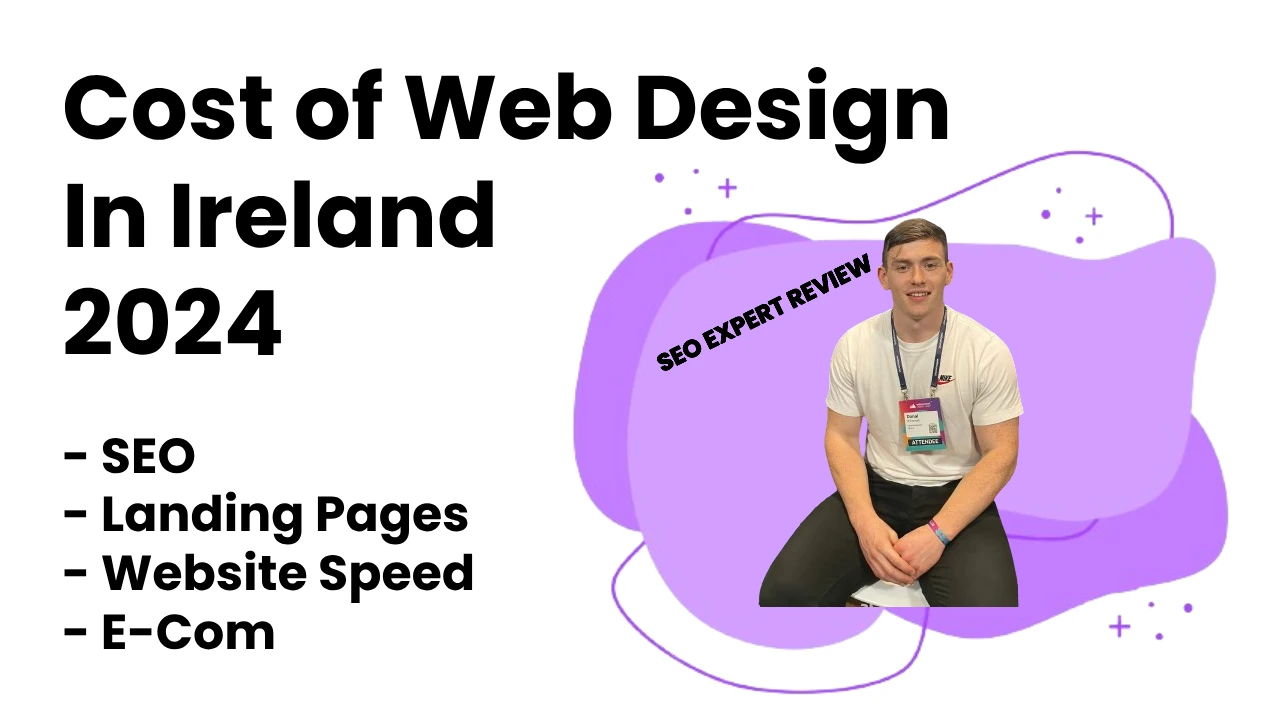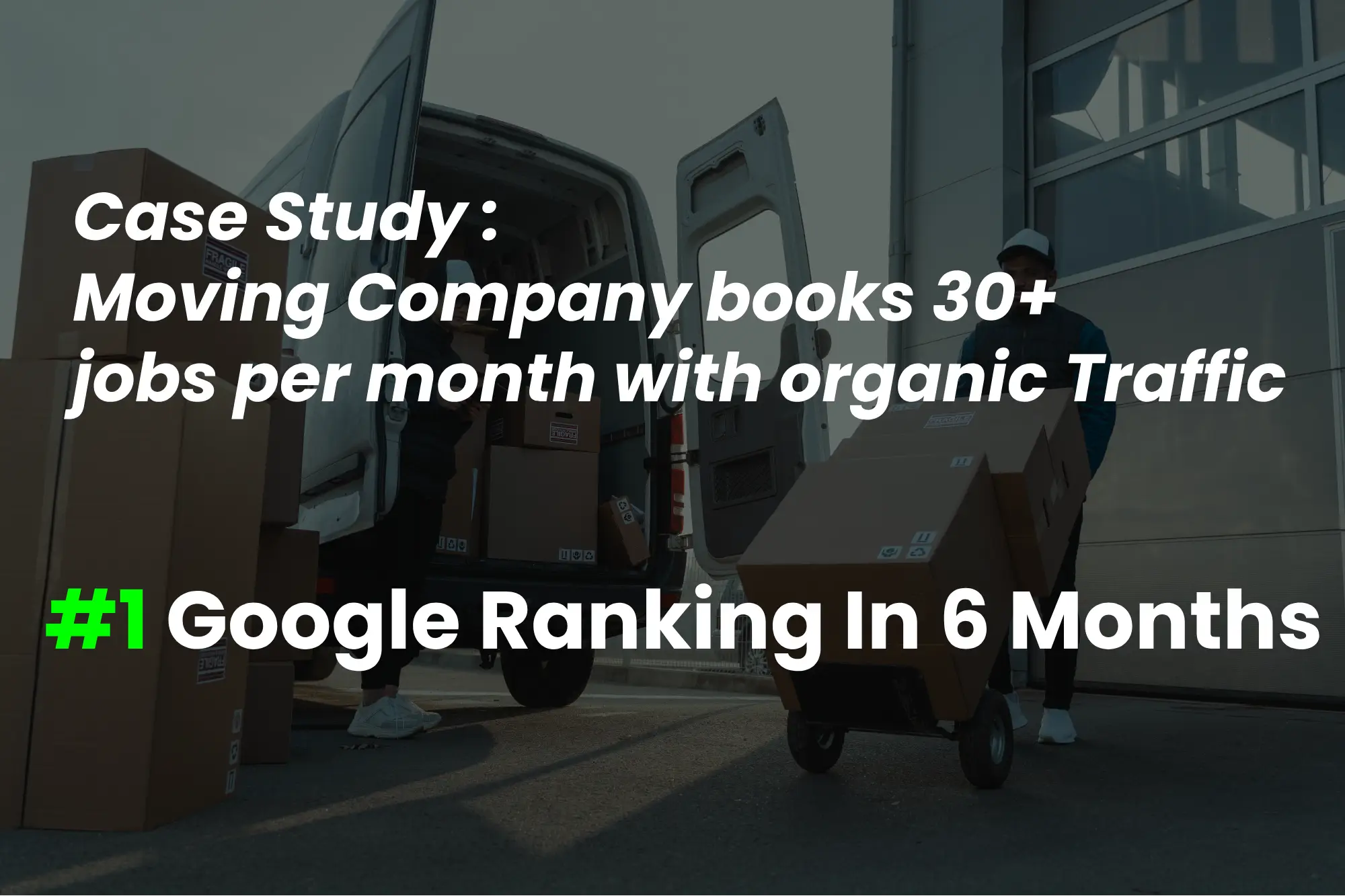
What is the cost of Web Design in Ireland?
In this blog we will be covering how much it costs to build a website in Ireland. We will cover what you should expect to pay for your new website and what to avoid when choosing a web designer.
In general you should expect to pay between €500 to €5000 however prices vary between the size and complexity of each website, for example you will pay more for an ecommerce website then you would for a simple landing page. The most common websites in Ireland fall into three categories :
- One page landing pages
- 5+ page small business websites
- E-commerce websites
Understanding the Pricing of a Landing Page
When it comes to the cost of a landing page, several factors come into play. Landing pages serve different purposes, and the pricing can vary based on the specific goals and requirements of the project. Let's break down the cost considerations for different types of landing pages:
1. Basic Landing Pages (Up to €150):
Basic landing pages designed for pet projects or small events are generally cost-effective. They typically don't require extensive search engine optimization (SEO) or advanced features. For these types of landing pages, opting for a low-cost WordPress designer is common. You can generally expect to pay up to €150 for a small WordPress-based landing page. However, it's essential to note that such websites may not be suitable for business owners aiming to attract new customers and achieve top Google rankings. Learn more about why they might not be the best option here.
2. Conversion-Oriented Landing Pages (Around €500):
If your goal is to drive traffic to your website through Google ads and convert visitors into customers, a professionally designed landing page is crucial. These landing pages are optimized for conversions, incorporating sales funnels, lightning-fast load times, and professional copywriting to engage visitors and drive action. You can expect to invest around €500 for a well-designed, single-page website that is geared towards maximizing conversions. Check out how we helped this Cleaning Company secure over €1000 in jobs within 7 days of launching using Google Ads.
3. SEO and Mobile Optimization:
Landing page costs can also be influenced by additional features such as SEO optimization and mobile responsiveness. If your landing page needs to rank well on search engines or provide an optimal experience on mobile devices, these factors may increase the overall cost.
4. Goal Alignment:
The specific goals of your landing page play a significant role in determining the cost. If you're looking for a simple, information-based landing page, it may be less expensive. However, if your objective is to generate leads, promote products, or encourage sign-ups, the complexity of the design and functionality may warrant a higher investment.
The cost of a landing page can fluctuate significantly based on its intended purpose and the degree of sophistication needed. For simple landing pages designed for personal projects or small-scale events, the expenses are generally quite economical. In contrast, landing pages crafted to drive conversions through Google ad campaigns often come with a higher price tag. It's crucial to select the option that best suits your objectives. Additionally, take into account factors such as SEO integration, mobile optimization, and the quality of design and content to ensure your landing page achieves its intended outcomes.

Understanding the Pricing Breakdown for a 5+ Page Website
When considering the cost of a 5+ page website for your small business, it's essential to delve into the specifics to make an informed decision. The pricing for such a website can vary significantly based on several key factors, so let's break it down for you:
1. Basic Website Costs (€500 - €1000):
At the lower end of the price range (around €500 - €1000), you'll find websites typically built on platforms like WordPress. These sites are budget-friendly but often lack advanced features and SEO services. While they provide an online presence, they may require you, as the business owner, to handle SEO, updates, and ongoing management.
2. Intermediate Website Costs (€1000 - €1500):
In this mid-tier range, you can expect a more robust website. It may still be built on platforms like WordPress but will likely include some basic SEO optimizations. These websites offer improved functionality and design, making them suitable for businesses aiming for a better online presence.
3. High-Quality Website Costs (€1500 - €2500):
High-quality websites are designed to excel in both aesthetics and functionality. They are typically hand-coded to ensure lightning-fast page speeds, and they prioritize SEO to improve search engine rankings. These websites often feature high-quality images, professional copywriting, and in-depth keyword research to target valuable commercial keywords.
4. SEO Considerations:
SEO plays a significant role in website pricing. Websites at the lower end of the price range may not include SEO services, leaving you responsible for SEO efforts. In contrast, higher-end websites often incorporate comprehensive SEO strategies aimed at achieving first-page rankings on Google.
5. Unique Business Goals:
The specific goals of your business can also influence pricing. If your primary objective is to establish a basic online presence, a more budget-friendly website may suffice. However, if you're focused on attracting new customers and achieving top Google rankings, investing in a high-quality website with comprehensive SEO becomes crucial.
It's worth noting that we offer high-performing hand-coded websites with a unique pricing model: €0 down and €147 per month. These websites are designed to excel in both performance and SEO, with a track record of achieving impressive results.
For instance, one of our clients, a moving company in Cork, secured the #1 spot on Google within just six weeks, resulting in over €2000 worth of website-generated revenue each year. If you're a local service provider aiming to maximize your online presence and attract new customers, this option may be ideal for you.
Feel free to get in touch with us today. As a limited-time offer, we're providing our lifetime support service at a 30% discount until the end of October. We're here to help you achieve your online business goals effectively and efficiently.

The Cost of E-Commerce Development: What Factors Impact Your Budget?
For an e-commerce website you should expect to pay between 1500 - 25000. However when it comes to building an e-commerce website, there's no one-size-fits-all answer to the question of cost. The price tag of your e-commerce project can vary widely depending on several key factors. In this section, we'll dive into the elements that influence the cost of e-commerce development, helping you understand what to expect and how to plan your budget effectively.
1. Website Size and Complexity
The first factor that significantly impacts the cost of e-commerce development is the size and complexity of your website. Simply put, larger and more intricate websites require more time, effort, and resources to build. If you're planning to launch an extensive e-commerce platform with hundreds or thousands of products, numerous product categories, and complex product attributes, expect higher development costs.
2. Platform Selection
Your choice of e-commerce platform plays a crucial role in determining your project's cost. Popular e-commerce platforms like Shopify, WooCommerce, Magento, and custom-built solutions all come with different price structures and considerations. Some platforms may charge monthly fees, transaction fees, or licensing costs, while others offer open-source solutions that require more development work but have lower upfront fees.
3. Customization and Design
A unique and user-friendly design is essential for attracting and retaining customers. Extensive customization, including tailored templates, layouts, and branding, can enhance your e-commerce site's appeal but also add to development costs. Be prepared to allocate a portion of your budget to design and customization if you want to stand out in a competitive market.
4. Product Catalog and Management
The size and complexity of your product catalog can significantly impact development costs. Managing a vast array of products, categories, and attributes requires meticulous planning and development work. While a smaller product catalog might entail less work, a comprehensive and well-organized catalog can improve the user experience and drive more sales.
5. Payment Gateway Integration
Integrating various payment gateways into your e-commerce site is essential for facilitating secure transactions. Different payment gateways come with varying levels of complexity and associated costs. Depending on your target audience and geographic reach, you may need to integrate multiple payment options, each with its own setup and maintenance expenses.
6. Security Measures
Security is paramount in e-commerce. Implementing robust security measures, including SSL certificates, PCI compliance, and data encryption, is non-negotiable. While these measures are essential for safeguarding customer data and trust, they can also contribute to your development costs.
7. Mobile Responsiveness
With the increasing use of mobile devices for online shopping, ensuring your e-commerce site is mobile-responsive is crucial. Building a seamless and user-friendly mobile experience may require additional development work, impacting your budget. However, it's an investment that pays off in improved customer satisfaction and increased sales.
8. Shipping and Inventory Management
For businesses that ship physical products, integrating shipping and inventory management systems is essential. The complexity of these integrations can vary based on your shipping options, inventory size, and order fulfillment processes, all of which can influence development costs.
9. Third-Party Integrations
To enhance your e-commerce site's functionality, you may need to integrate with third-party services such as customer relationship management (CRM) systems, email marketing tools, and analytics platforms. Each integration comes with its own set of costs, and the complexity of these integrations can affect your overall budget.
10. Content Management System (CMS)
Your choice of a content management system (CMS) can have cost implications. Some platforms require licensing fees, while others are open-source and free but may require more development work. Consider the long-term costs and benefits of your chosen CMS as part of your budgeting process.
In the next part of this series, we'll continue exploring the factors that influence the cost of e-commerce development, including hosting, development team expertise, ongoing maintenance, and more. Understanding these elements will help you create a realistic budget and set the stage for a successful e-commerce venture.
Additional Costs of E-Commerce Development
Beyond the initial development costs, e-commerce websites come with ongoing expenses that every business owner should be aware of. These costs are essential for maintaining a functional and successful online store.
1. Website Hosting
Website hosting is a fundamental requirement for any e-commerce website. It involves renting server space and resources to make your online store accessible to visitors. Hosting fees can vary widely based on factors such as the hosting provider, the server type (shared, VPS, dedicated), and the hosting plan's features.
- Shared Hosting: This is typically the most affordable option, ranging from €15 to €50 per month. However, it may not be suitable for high-traffic e-commerce sites due to shared server resources.
- VPS Hosting: Virtual Private Servers (VPS) offer better performance and scalability, with prices ranging from €30 to €100 per month. VPS hosting is a common choice for growing e-commerce businesses.
- Dedicated Hosting: For large e-commerce stores with high traffic, dedicated hosting provides dedicated server resources but comes at a higher cost, ranging from €100 to €300+ per month.
The choice of hosting depends on your site's traffic, scalability needs, and budget. It's essential to balance cost-effectiveness with the level of performance required to deliver a smooth shopping experience to your customers.
2. Website Maintenance
Website maintenance is an ongoing requirement to ensure your e-commerce site functions flawlessly. It includes tasks such as updating software, fixing bugs, and addressing security vulnerabilities. Maintenance fees can vary based on the complexity of your site and the frequency of updates.
- Basic Maintenance: For simpler e-commerce sites, basic maintenance may cost around €30 to €75 per month. This covers essential updates and security checks.
- Advanced Maintenance: Larger and more complex e-commerce websites may require more comprehensive maintenance, which can range from €75 to €150 per month or more. This includes more frequent updates, performance optimization, and enhanced security measures.
Website maintenance is crucial for safeguarding your website's integrity and providing a secure shopping environment for your customers. Neglecting maintenance can lead to security breaches, a poor user experience, and loss of sales.

3. Search Engine Optimization (SEO)
Investing in Search Engine Optimization (SEO) is a common strategy for maximizing the return on investment from your e-commerce website. SEO encompasses various services aimed at improving your site's visibility on search engines and driving organic traffic. While SEO costs can vary significantly, they generally cover the following services:
-
Keyword Research: Identifying relevant keywords and phrases that potential customers are searching for.
-
On-Page Optimization: Optimizing website content, meta tags, and images for search engines.
-
Link Building: Acquiring high-quality backlinks from reputable websites to boost your site's authority.
-
Content Creation: Developing informative and engaging content, including blog posts, product descriptions, and guides.
-
Technical SEO: Ensuring your website's technical aspects, such as site speed and mobile-friendliness, meet search engine requirements.
-
Monitoring and Reporting: Tracking SEO performance and making adjustments based on data and analytics.
Search engine optimization services will cost between 500-2000 per month depending on your business niche and the level of competition you are facing. We cover the costs associated with SEO in great detail in our recent blog - What is the cost of SEO in Ireland?



